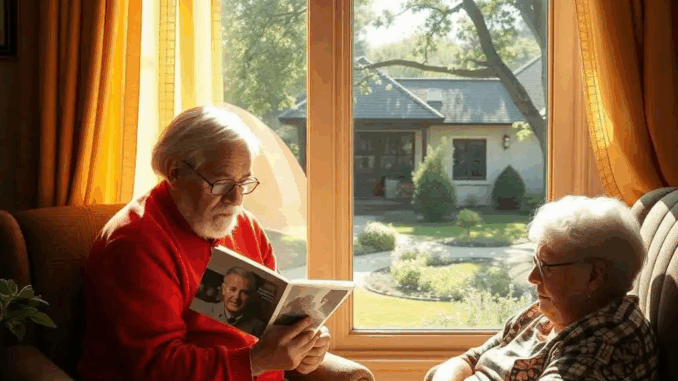

“Like I have cats scratching my soul” — my decision about Grandpa breaks my heart.
In a small town near Toledo, where ancient olive trees shaded the summer heat, my life at 38 teetered on the edge of a moral abyss. My name is Carmen, and I’ve made a decision that saves our family, but tears at my soul. My mother cries, and even though it hurts, I know I must stand firm. Taking Grandpa to a nursing home isn’t betrayal, but a necessary step, but why does it weigh on me so much?
The family at the limit
My grandfather, Francisco Jiménez, is the man I adored since I was a child. His stories of the postwar period, his kind eyes, his warm hands—everything was part of my world. He is 87 years old, and has declined significantly lately. Alzheimer’s has robbed him of his memory, his lucidity, his independence. He no longer remembers who I am, he confuses day with night, and sometimes leaves the house and gets lost. My mother, Dolores Martínez, 62, tries to take care of him, but it is wearing her down.
The three of us live in our usual apartment: my mother, my grandfather, and me. My husband, Javier, and our two children, Sofía and Daniel, have moved into a rental because living there has become unbearable. My grandfather demands constant attention: he might leave the gas on, spill his coffee, or scream in the middle of the night. My mother can’t sleep, her health is deteriorating, and I’m torn between work, the children, and trying to help. We’re at our limit—physically and emotionally.
The hardest decision
I resisted for months, but a few weeks ago I realized Grandpa needed professional care. I found a decent nursing home on the outskirts—clean, with friendly staff, where he would be watched day and night. I decided I would pay for his stay myself, so as not to overwhelm my mother. It’s expensive, but I’m willing to work harder, to look for extras, as long as he’s safe and she can breathe.
When I told my mother, she burst into tears. “Carmen, how can you? He’s your grandfather, the one who raised us, and you abandon him like he’s a piece of junk.” Her words burned like acid. She looked at me reproachfully, always on the verge of tears. I tried to explain that it wasn’t abandonment, but care—for him, for her, for everyone. But she didn’t listen. To her, being a resident is exile, it’s shame. She thinks I chose the easy way out, even though this path breaks my heart.
The guilt that never ceases
Every night I lie awake, with the cats scratching me inside. I see the grandfather who stroked my hair when I was little. I hear his laughter, his stories. Now he looks at me with empty eyes and asks, “Who are you?” I blame myself for not being able to do it alone, for not giving him a home like he gave me. But I know he’s not safe at home. Yesterday he almost started a fire when he forgot to turn off the stove. We can’t live with that fear.
Javier supports me, although sometimes he asks, “Carmen, are you sure? He’s your grandfather.” His doubts fuel my guilt. Sofía and Daniel are young, but they sense the tension. Sofía recently told me, “Mom, they won’t take Grandpa away, will they?” I hugged her, but I didn’t know what to say. How could I explain that I’m doing it out of love, not indifference?
The truth that corrodes
My mother barely speaks to me. She stubbornly looks after Grandpa, as if trying to prove me wrong. But I see her wearing thin: her back hunches, her hands tremble, she cries when she thinks I’m not looking. I tried to speak again, but she cut me off: “You want to get rid of your father so you can live your life.” It’s not true, but her words poison me.
I know the nursing home is the best way out. There they’ll care for him, feed him, entertain him. I know it, but still, every time I close my eyes, I imagine his face lost between foreign walls, and the weight of my decision chokes me more than tears.
Để lại một phản hồi